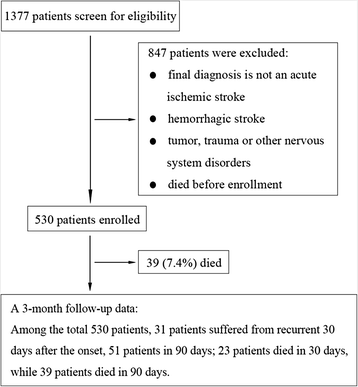Metabolic syndrome and the short-term prognosis of acute ischemic stroke: a hospital-based retrospective study
- PMID: 26199022
- PMCID: PMC4511539
- DOI: 10.1186/s12944-015-0080-8
Metabolic syndrome and the short-term prognosis of acute ischemic stroke: a hospital-based retrospective study
Abstract
Background: Metabolic syndrome (MetS) is an important risk factor for cerebral ischemic stroke, yet previous studies on the relationship between MetS or its components and acute cerebral infarction have been inconsistent. This study aims to evaluate the effects of MetS and its components on the short-term prognosis of patients with acute ischemic stroke.
Methods: Subjects with ischemic stroke of <7-day duration (530 cases) were enrolled. MetS was defined based on the modified criteria of the International Diabetes Federation and the American Heart Association/National Heart, Lung, and Blood Institute. Demographic data, vascular risk factors, National Institutes of Health Stroke Scale score, the results of physical, laboratory and imaging examinations and clinical outcomes at 30 and 90 days were recorded. Using univariate analysis, we compared different baseline characteristics between patients with MetS and those without MetS. Further, we assessed MetS and its 5 components on the contribution to short-term prognosis of ischemic stroke with multiple logistic regression models after adjusting for age and sex.
Results: The prevalence of MetS among the patients with acute ischemic stroke in the study is 58.3%, with more in females (70.3%) than in males (49.7%, p < 0.001). As expected, among the MetS components, elevated waist circumference, elevated triglyceride, high fasting blood glucose and low high density lipoprotein cholesterol (HDL-C) were significantly more prevalent in patients with MetS than those without MetS (all p < 0.001). There was no correlation between MetS itself and the short-term prognosis of acute ischemic stroke. Only hyperglycemia in the serum was shown to have impact on poor functional outcomes in 30 and 90 days after the onset of stroke.
Conclusions: The occurrence of MetS among patients with acute ischemic stroke in our study is 58.3%. MetS itself may not be predictive for the short-term prognosis of patients, while hyperglycemia is a significant predictor for poor functional outcomes in our study.
Similar articles
-
Metabolic Syndrome Augments the Risk of Early Neurological Deterioration in Acute Ischemic Stroke Patients Independent of Inflammatory Mediators: A Hospital-Based Prospective Study.Oxid Med Cell Longev. 2016;2016:8346301. doi: 10.1155/2016/8346301. Epub 2016 Mar 29. Oxid Med Cell Longev. 2016. PMID: 27119010 Free PMC article.
-
The metabolic syndrome is associated with a higher resistance to intravenous thrombolysis for acute ischemic stroke in women than in men.Stroke. 2009 Feb;40(2):344-9. doi: 10.1161/STROKEAHA.108.531079. Epub 2008 Dec 24. Stroke. 2009. PMID: 19109538
-
Association between metabolic syndrome and previous ischemic lesions in patients with intracranial atherosclerotic stroke.Clin Neurol Neurosurg. 2008 Mar;110(3):215-21. doi: 10.1016/j.clineuro.2007.10.016. Epub 2007 Dec 4. Clin Neurol Neurosurg. 2008. PMID: 18055103
-
Prognostic interactions between cardiovascular risk factors.Dan Med J. 2014 Jul;61(7):B4892. Dan Med J. 2014. PMID: 25123126 Review.
-
Sex differences in neuroinflammation and neuroprotection in ischemic stroke.J Neurosci Res. 2017 Jan 2;95(1-2):462-471. doi: 10.1002/jnr.23962. J Neurosci Res. 2017. PMID: 27870410 Free PMC article. Review.
Cited by
-
The frequency and impact of admission hyperglycemia on short term outcome of acute stroke patients admitted to Tikur Anbessa Specialized hospital, Addis Ababa, Ethiopia: a cross-sectional study.BMC Neurol. 2019 Dec 27;19(1):342. doi: 10.1186/s12883-019-1578-x. BMC Neurol. 2019. PMID: 31881850 Free PMC article.
-
The neutrophil to lymphocyte ratio (NLR) positively correlates with the presence and severity of metabolic syndrome in obese adults, but not in obese children/adolescents.BMC Endocr Disord. 2023 May 26;23(1):121. doi: 10.1186/s12902-023-01369-4. BMC Endocr Disord. 2023. PMID: 37237368 Free PMC article.
-
Association of triglyceride-glucose index with clinical outcomes in patients with acute ischemic stroke receiving intravenous thrombolysis.Sci Rep. 2022 Jan 31;12(1):1596. doi: 10.1038/s41598-022-05467-6. Sci Rep. 2022. PMID: 35102177 Free PMC article.
-
Risk Factors, Clinical Features and Prognosis for Subtypes of Ischemic Stroke in a Chinese Population.Curr Med Sci. 2018 Apr;38(2):296-303. doi: 10.1007/s11596-018-1878-1. Epub 2018 Apr 30. Curr Med Sci. 2018. PMID: 30074188
-
Incidental Unruptured Intracranial Aneurysms Do Not Impact Outcome in Patients With Acute Cerebral Infarction.Front Neurol. 2021 Apr 26;12:613027. doi: 10.3389/fneur.2021.613027. eCollection 2021. Front Neurol. 2021. PMID: 33981282 Free PMC article.
References
-
- Alberti KG, Zimmet PZ. Definition, diagnosis and classification of diabetes mellitus and its complications. Part 1: diagnosis and classification of diabetes mellitus provisional report of a WHO consultation. Diabet Med. 1998;15:539–53. doi: 10.1002/(SICI)1096-9136(199807)15:7<539::AID-DIA668>3.0.CO;2-S. - DOI - PubMed
Publication types
MeSH terms
LinkOut - more resources
Full Text Sources
Other Literature Sources
Medical
Research Materials


